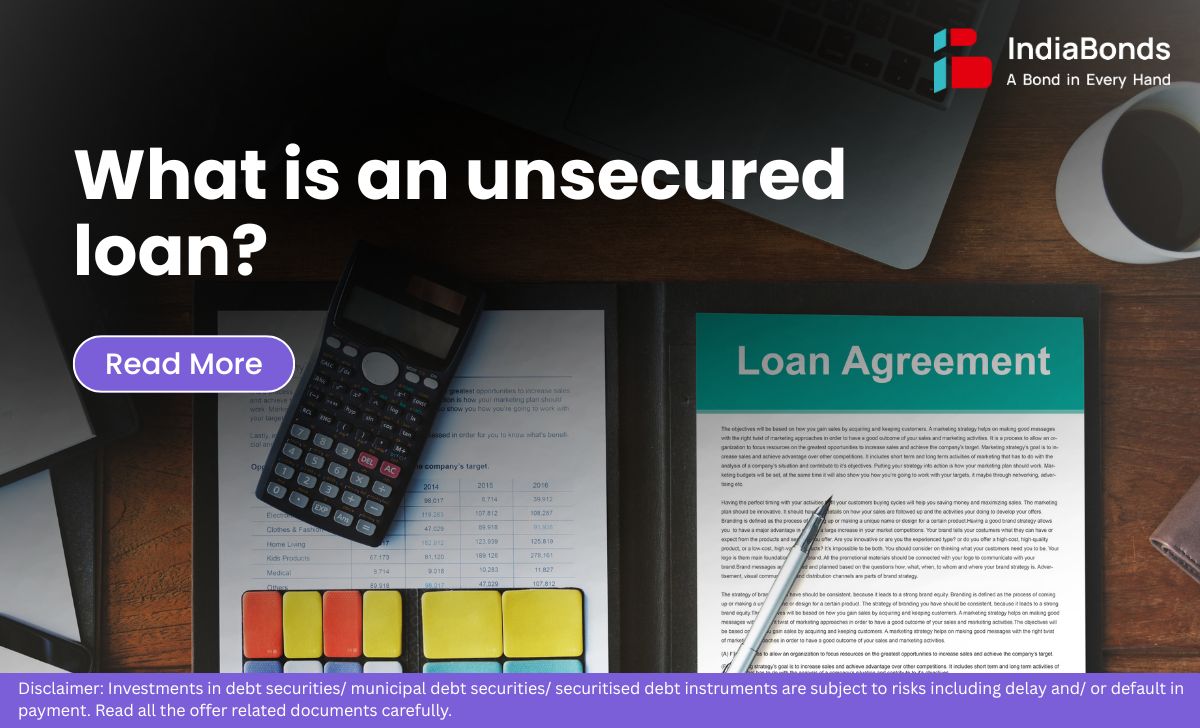What is an unsecured loan?

Real life does not pause for paperwork. A hospital deposit, a rent advance, or a fee deadline can arrive together. In moments like these, an unsecured loan helps because no property or deposit is pledged. Three quick takeaways explain it well:
- Approval leans on credit behaviour and income rather than collateral.
- Most steps are digital, so decisions are faster.
- Pricing follows risk; stronger profiles usually get better terms.
Used with a plan, it covers a short gap without disturbing long term savings. Used casually, it can crowd monthly cash flow.
What is an unsecured loan?
An unsecured loan is credit offered without taking any asset as security. Since nothing is pledged, the lender studies credit score, repayment history, employer or business stability, and current EMIs to decide eligibility and rate. Two people with the same need may receive very different offers. The comfort is speed and flexibility because there is no valuation visit or lien on assets. Anyone asking what is an unsecured loan can think of it as trust based lending supported by data.
Who should get an unsecured loan?
This option fits a borrower who needs quick funds, does not want to mortgage assets, and can handle the EMI easily. It helps when the purpose is clear and the amount is sensible for income. Typical use cases include:
- Salaried professionals managing medical expenses, relocation costs, or a rent deposit.
- Self employed people bridging a short seasonal cash flow gap.
- Households consolidating small card balances into one predictable EMI.
- Individuals who want minimal documentation and a fixed repayment schedule.
Types of unsecured loans
Different needs call for different shapes of credit. The common types of unsecured loans include:
- Personal loan: multi purpose funds usable for most legitimate expenses.
- Credit card or revolving line: spend first, repay later; interest applies to unpaid dues.
- Education loan (unsecured portion): offered up to a threshold for meritorious students.
- Professional or small business loan: for doctors, CAs, freelancers, and MSMEs.
- Consumer durable or BNPL finance: short tenure credit for purchases and repairs.
Pros and cons of unsecured loans
A practical borrower weighs the pros and cons of unsecured loans before applying.
Pros
- No asset pledge; family property and deposits remain untouched.
- Faster approval and disbursal due to a light, digital process.
- Flexible end use and predictable EMIs; part prepayment is often allowed.
Cons
- Rates can be higher than secured credit because the lender takes more risk.
- Tenures are shorter and limits smaller for many profiles.
- Missed EMIs dent the credit score quickly and can invite charges.
Qualifications for an unsecured loan
Lenders look for steady, verifiable repayment capacity. Key checks usually include:
- Credit score and history: preferably in the good zone with clean past repayments.
- Income stability: consistent salary credits or reliable business turnover.
- Obligation ratio: existing EMIs should not crowd monthly income.
- KYC and bank statements: to verify identity and cash flow patterns.
- Employer or business profile: company category, job continuity, or business vintage.
What are the benefits of an Unsecured Loan?
Day to day, the advantages of unsecured loan products are simple to see. Funds arrive quickly without risking a home or fixed deposit. There is no valuation delay or charge creation, so timelines stay short. Documentation is light and end use flexible. Many borrowers also use it to tidy up multiple dues into one schedule, which keeps planning clean and protects savings from being broken at the wrong time.
How to Apply Unsecured Loan?
The modern journey is straightforward and mostly online:
- Fill a short form with personal, work, and income details.
- Upload KYC, income proofs, and bank statements, then consent to a bureau check.
- Review the offer carefully: amount, interest, tenure, processing fee, and total cost of credit.
- E sign the agreement and set up auto debit for the EMI.
Good habits help. Compare two or three lenders, read the schedule of charges, and keep a small buffer so debit dates never bounce. In simple words, apply for an unsecured loan only when the EMI fits comfortably.
Conclusion
Used responsibly, an unsecured loan is a clean bridge between today’s need and tomorrow’s income. Anyone revisiting what is an unsecured loan will see a clear trade off: convenience and speed in exchange for pricing that reflects personal risk. When the amount is sensible, the purpose is clear, and repayments are automatic, this product solves problems quickly without putting family assets on the line.
FAQs
What does unsecured loan mean?
It is a loan given without collateral. Approval relies on credit score, income steadiness, and past repayment behaviour rather than a pledged asset.
Which are unsecured loans?
Personal loans, credit cards, unsecured business or professional loans, unsecured portions of education loans, and consumer durable or BNPL finance are common examples.
Which is an example of an unsecured loan?
A personal loan taken for medical expenses or a credit card balance qualifies because no property or deposit is pledged.
Which loan is better, secured or unsecured?
Neither is better for everyone. Secured loans can be cheaper but need collateral and more paperwork. An unsecured loan is faster and flexible, though the rate may be higher.
Disclaimer : Investments in debt securities/ municipal debt securities/ securitised debt instruments are subject to risks including delay and/ or default in payment. Read all the offer related documents carefully.
































